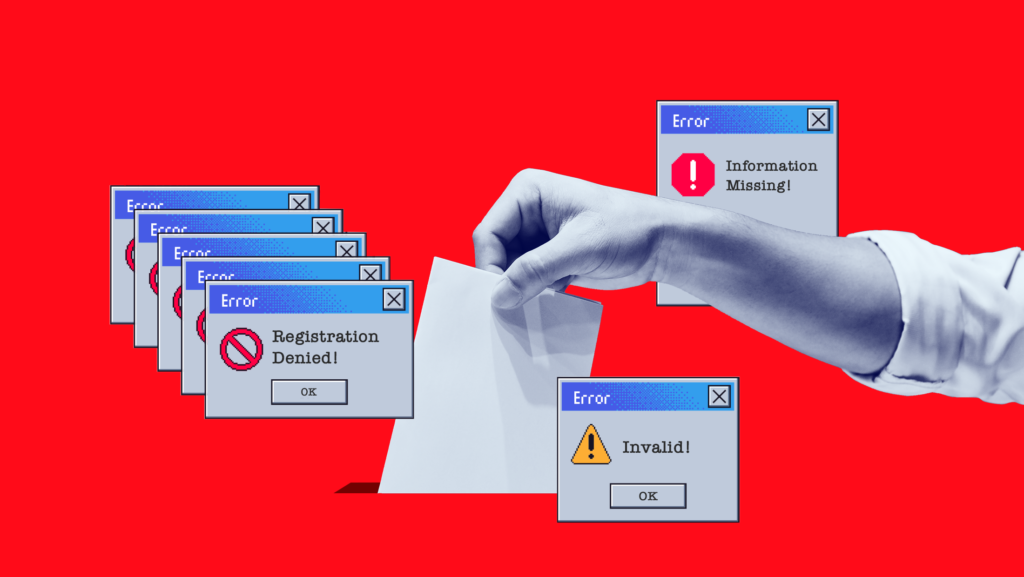One Reform Can Significantly Expand Voting Rights

Once again, highly restrictive voting laws are on the rise in America. In the wake of the 2020 election’s historically high turnout, Republican state legislatures in Georgia, Florida, Arizona and six other states have already passed measures that unnecessarily burden the right to vote, especially for Black, Latino and tribal communities. The Texas legislature is currently advancing similar vote-suppressing legislation, and Republican legislators in states across the country are attempting to do the same. Supporters of these bills have echoed a common refrain: that we need to make it “easier to vote, and harder to cheat.”
This platitude is meant to hide a simple truth. These laws undermine the very real need for more convenient voting based on the bogeyman of voter fraud.
Twenty years of research and court cases show that voter fraud in the United States is rare and isolated. Because of President Trump’s repeated lies about election tampering, the 2020 election was one of the most scrutinized in our nation’s history. The results were decisive: there were no meaningful irregularities in the 2020 elections. The average American is more likely to be struck by lightning than to commit voter fraud.
The truth is, voter fraud is exceedingly rare. We’ve succeeded in making it harder to cheat. But holding free and fair elections means more than showing an absence of fraud. We must ensure equal and universal access to the ballot box. Across the country, discriminatory barriers to voting are all too common.
It is now time to get to work on making it easier to vote.
AVR just makes sense. Citizens should not have to opt-in to their fundamental right to vote, any more than they have to opt in to free speech or due process. It is the government’s job to make voting easy.
One simple reform with an outsized impact is automatic voter registration (AVR). States with AVR meet voters where they are, offering automatic, opt-out registration to every eligible citizen at places like the Department of Motor Vehicles.
AVR just makes sense. Citizens should not have to opt-in to their fundamental right to vote, any more than they have to opt in to free speech or due process. It is the government’s job to make voting easy.
Before I was appointed to the Senate, I served as California’s Secretary of State, where I was in charge of running elections in the largest and most diverse democracy in the nation. During my tenure, we implemented AVR. An analysis by the Brennan Center for Justice found that in under a year, we increased voter registrations by more than 25% due to the new policy. And in the three years since AVR was first adopted in California, more than 2.9 million new voters have registered through the DMV. California’s AVR has led to the largest ongoing voter registration drive in US history.
Other states have achieved similar successes. From Alaska to Colorado to Michigan, AVR programs are strengthening and expanding our democracy.
Critically, AVR encourages participation from those who might feel underrepresented in government. It links voter registration with a common task — obtaining or renewing a driver’s license or a state ID. When we register new voters, we can also provide them with helpful information and reminders in advance of elections.
AVR also helps address Republicans’ mythic fear — that extra votes will be cast fraudulently — by helping update voter registration rolls. When an eligible voter in an AVR state like California interacts with the DMV, they have the opportunity to create, update or confirm their voter registration. As a result, California’s DMVs have processed more than 20 million registration-related transactions in just the last three years. Especially in combination with other voter-friendly innovations like online voter registration and same-day registration, AVR has helped California maintain more accurate voter records, while at the same time improving access to the ballot box.
Voting innovations like AVR, which help to expand our democracy, should not be limited to California. While 19 other states — including red and purple states like Alaska and Maine — and the District of Columbia have adopted the reform, too many voters face additional barriers to registration. That is why I am a proud supporter of the For the People Act, which includes the expansion of AVR, and other critical voting rights reforms to every state. It will help us finally make good on Republicans’ forgotten promise to make it easier to vote.
The right to vote is precious. It is the fundamental bedrock of our democracy. At every step, politicians need to make it easier, not harder, for citizens to exercise their rights and hold us accountable. I’m proud of the progress California has achieved with AVR. It’s time for the country to follow our lead and implement automatic voter registration for all.
Senator Alex Padilla represents California in the U.S. Senate.